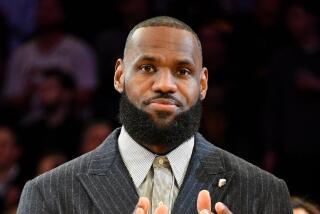Critics Fear Quest for Profit Is Tainting King’s Legacy
ATLANTA — As thousands trek south to recall a civil rights martyr, a new cartoon video and controversial new book on Dr. Martin Luther King Jr.’s life have rekindled worries that King’s rich legacy of selflessness is on the auction block.
King’s youngest son, Dexter, 37, hasn’t been subtle in changing the direction of the Martin Luther King Jr. Center for Nonviolent Social Change here. Originally it was intended as a training ground for future civil rights crusaders; critics say it has become an enterprise that puts profit ahead of principle.
But now, as devotees journey to the King center this week on what would have been King’s 70th birthday, the criticism is growing over an “autobiography” King didn’t write, which the family helped produce, and over an animated video about the civil rights legend, who ranks among the most admired Americans of all time.
“People don’t feel the impact of the center, programs to improve the quality of people’s lives. Since Dexter has been running it, you get
the feeling it’s nothing more than a money-making machine,” said the Rev. Joseph Lowery, a former King associate and past president of the Southern Christian Leadership Conference, which King founded.
Of the cartoon, titled “My Friend, Martin,” Lowery said he wouldn’t pass judgment until he sees it for himself. But the image of his former colleague as an animated figure leaves him a bit queasy.
The cartoon features a multiracial group of children who get transported back in time and meet a teenage Martin Luther King Jr. It features the voices of LeVar Burton and James Earl Jones.
“I stand in fear and am trembling that Martin is going to be Mickey Moused and Fat Albertized. What I’ve heard about so far has been negative,” Lowery said.
Neither Dexter King nor his mother, Coretta Scott King, would agree to be interviewed for this article.
Dexter King, however, has said in the past that he seeks to bring fiscal order to what has been a cash-strapped program at the center. He also said he has little interest in succeeding his father as a civil rights figure.
“I’m not trying to be preachy or be on a pedestal,” Dexter King said in a 1997 interview. “I’m not trying to effect change on that level.”
Dexter King Succeeded Mother at the Center
Critics say that a change for the worse is the best way to describe the moves Dexter King has made since succeeding his mother, as chief steward of the King center in 1994.
Dexter King trimmed the center’s staff, closed a child care center and bickered with the National Park Service over a site he wanted for an interactive museum. No museum has been built.
He also began to aggressively enforce the family’s control over words and images of the slain civil rights advocate, to the point where the estate sued news organizations for excerpting King’s famous “I Have a Dream” speech.
And his absolution of James Earl Ray, the man convicted of the 1968 murder of his father, left civil rights stalwarts who worked with the late activist, including Lowery, Julian Bond and the Rev. Samuel Billy Kyles, shaking their heads.
Martin Luther King Jr.’s view on money during his life isn’t easy to ascertain, Bond said. Although King donated the $54,000 he received with his 1964 Nobel Peace Prize to civil rights groups, he also copyrighted his speeches and books during his lifetime.
“I know money wasn’t the driving force of his life,” Bond said. “He might have looked askance at some of the fund-raising activities of his progeny, but these are different times.”
From omnipresent banners on street signs to statues and carvings on street corners, the visage of the slain civil rights leader can be found everywhere in Atlanta.
At the King center, in a run-down section of the city, the smell of fresh paint wafts through the corridors of the exhibit hall as workers spruce up the area for an expected throng.
Groups of children peer at display cases of King memorabilia. But there’s scant involvement in the lives of the people surrounding the center.
“The center used to have a community liaison who was very active,” Bond said. “But now I sense it has little or no involvement in the larger community outside their door.”
David J. Garrow, Pulitzer Prize-winning biographer of King, said, “I don’t think anyone can challenge the family’s right to make money. But the reputation damage the Kings have suffered in recent years can’t be worth the money they’ve made. It’s a matter of degree, scale and style.”
Issues of degree, scale and style are among concerns raised by some with the release of a new “autobiography” engineered by the King family as part of a multimillion-dollar deal with Warner Books to expand Martin Luther King Jr.’s presence in popular culture.
The cornerstone of the effort is the recently published “The Autobiography of Martin Luther King Jr.,” edited by Stanford University history professor Clayborne Carson, a King scholar.
Other works planned as part of the Warner Books deal are an Internet site, recordings of his speeches, and books by both Coretta Scott King and Dexter King.
A few reviews have credited Carson with researching hundreds of thousands of documents that Martin Luther King Jr. penned about his life to cobble together the book. But eyebrows have been raised by the use of the word “autobiography” in the title of a book King clearly didn’t write.
“It’s quite a curious product,” said Calvin Reid, news editor at Publisher’s Weekly. “I think it’s a mistake calling it an autobiography. It raises questions about who you are trying to fool.”
Author Shrugs Off Concerns Over Title
For his part, Carson said he is solely responsible for the book’s title and shrugs off concerns about it.
“I realized some people might see it as presumptuous to call it an autobiography, but it’s a silly controversy,” Carson said. “I wish people would just accept it for what it is.”
Carson said he expressed his own concerns to Dexter King about the suggestion that money interests trumped an earnest desire to spread his father’s legacy to future generations.
“I told Dexter there were some mistakes made when they emphasized how much money was going to be made on the deal and not what was the most important aspect--to get the word out to a whole new generation on what King stood for,” Carson said.
Carson said the debate has him feeling trapped.
“I feel like the message of the book is getting lost in this battle over the King family,” he said.
Joseph Roberts, pastor of Dr. King’s Ebenezer Baptist Church, said critics of the King family might be more willing to allow for a few mistakes if they saw the King Center doing more to address the societal ills Martin Luther King Jr. would have fought today.
But any reservoir of goodwill the King family might have built up is pretty dry, he said.
“Only they can answer whether they have any grand plans or programs [for the community],” Roberts said. “I can say the movement has taken a different direction from the time of Dr. King.”
More to Read
The biggest entertainment stories
Get our big stories about Hollywood, film, television, music, arts, culture and more right in your inbox as soon as they publish.
You may occasionally receive promotional content from the Los Angeles Times.










